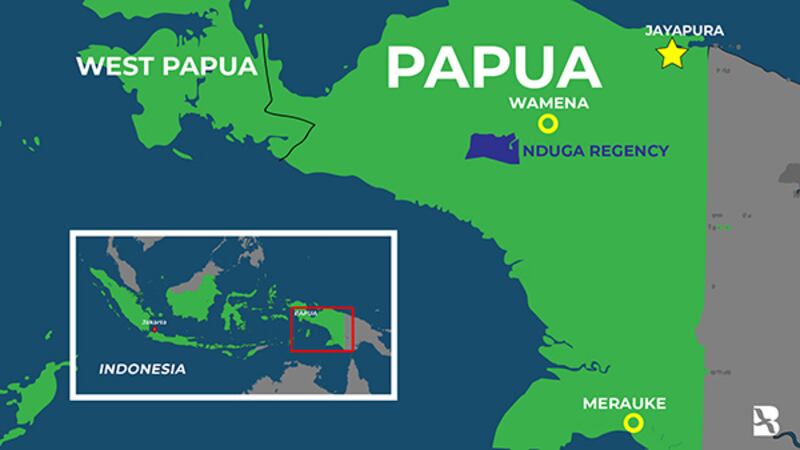A separatist group claimed responsibility Wednesday for attacks that left at least 20 people dead in Indonesia’s eastern Papua province, alleging that the people they killed were soldiers disguised as construction workers.
The attacks at the weekend and on Monday in the Mbua area of Nduga regency were led by the Egianus Kogoya, the local leader of the West Papuan National Liberation Army (TPNPB), the insurgent group’s spokesman Sebby Sembom said.
The fatalities were soldiers under the Indonesian Army’s Combat Engineering Detachment (Denzipur) who had enlisted to build roads and bridges in the area, Sebby told BenarNews in a phone interview.
“It was a gunfight, not an execution. TPNPB has long been monitoring workers in Kali Awarok and Kali Yigi [districts]. They were members of Denzipur, not civilian workers,” Sebby said, without elaborating.
“All leaders and soldiers of the TPNPB National Command have a code of ethics in the revolutionary war. We will not fight against civilians,” he said.
Gen. Tito Karnavian, the Indonesian national police chief, told reporters in Jakarta that 19 construction workers and a soldier were killed.
Police in Papua had earlier said that rebels killed 31 workers who were building roads and bridges as part of the Trans-Papua highway project – part of President Joko “Jokowi” Widodo’s efforts to improve infrastructure in the province, where road access is limited due to jungle-clad terrain.
Authorities did not explain what caused the discrepancy in the reported number of fatalities.
Reinforcements
The Papua military garrison has sent soldiers as reinforcements to support the local police. Military officials told reporters they believed that 20 rebels were involved in the attacks.
“The TNI soldiers were already in Wamena after being flown from Sentani on a Hercules plane,” Maj. Gen. Joshua Sembiring, the Papuan military commander, told reporters.
At least 169 soldiers and police had been sent earlier to Nduga to retrieve the bodies of the dead and hunt for the suspects behind what police had described as the worst attack launched by an armed group in Indonesia in recent years.
As of Wednesday, however, attempts to collect the bodies were not successful due to difficult terrain and bad weather, police and military officials said.
On Tuesday, Col. Muhammad Aidi, a military spokesman, said security forces had rescued 12 people from Mbua, including three employees of the state-owned construction company PT Istaka Karya who suffered gunshot wounds.
Jokowi's statement
In Jakarta, President Joko “Jokowi” Widodo said he had ordered the military and the police to hunt those responsible for the “barbaric attacks.”
“I emphasize that there is no place for armed criminal groups in Papua and throughout the country,” he said during a news conference at the State Palace on Wednesday.
Former Gen. Moeldoko, the presidential chief of staff, called the killings an act of terrorism by the Free Papua Movement (OPM), which has fought for the mainly Melanesian region’s independence since the 1960s. The TPNPB is the OPM’s armed wing.
Despite the attacks, Moeldoko said security forces should not take disproportionate actions.
“Please act professionally and proportionally. Don’t get tempted to act in revenge,” he said.
Widodo said that the construction of the 4,600-kilometer (2,875-mile) Trans-Papua road would continue.
“We also will never be afraid. And this makes our determination even stronger to continue our great task of developing the land of Papua,” he said.
However, construction work on the Trans-Papua road in Nduga has been suspended pending a review on security measures, said the head of Jayapura's XVIII National Road Implementation Center, Osman Marbun.
“We are suspending the construction of the bridges, but other development activities elsewhere in Papua are still running, according to schedule,” he said.

Human rights
Meanwhile, Ahmad Taufan Damanik, chairman of the National Human Rights Commission (Komnas HAM), urged the authorities to resolve the case according to the rule of law and human rights principles.
“The government needs to make prevention efforts by involving various institutions and communities so that such events will not happen again,” Ahmad Taufan told reporters.
Papua, located at the far eastern end of the Indonesia, is one of the archipelago’s poorest regions despite its rich natural resources. The area where the violence took place was at about 1,500 meters (about 5,000 feet) above sea level.
Human rights groups have accused security forces of committing rights abuses during counter-insurgency operations.
Foreign journalists have been largely banned from reporting from Papua, with the government citing concerns for their security for the restrictions.
